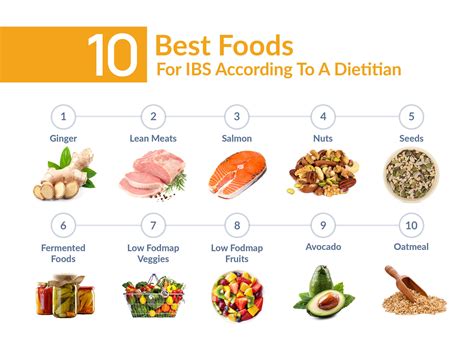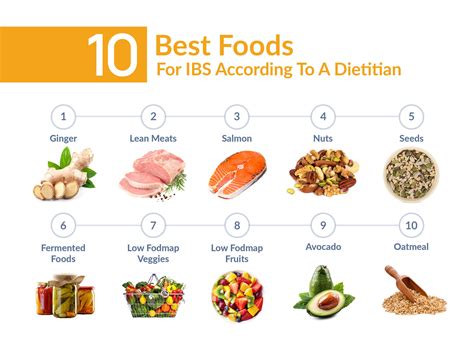Intro
Discover 7 IBS friendly foods to alleviate symptoms. Learn about low FODMAP diet options, gut-friendly recipes, and digestive health tips to manage irritable bowel syndrome naturally.
The importance of diet in managing Irritable Bowel Syndrome (IBS) cannot be overstated. IBS is a chronic condition that affects the large intestine, causing symptoms such as abdominal pain, bloating, and changes in bowel movements. While there is no cure for IBS, making informed food choices can help alleviate symptoms and improve overall quality of life. In this article, we will delve into the world of IBS-friendly foods, exploring the benefits, working mechanisms, and practical examples of how to incorporate these foods into your diet.
For individuals living with IBS, navigating the complex relationship between food and symptoms can be overwhelming. Certain foods can trigger or worsen IBS symptoms, while others can provide relief and support digestive health. By understanding which foods are IBS-friendly, individuals can take control of their diet and make informed choices to manage their symptoms. In this article, we will provide an in-depth exploration of IBS-friendly foods, including their benefits, working mechanisms, and practical examples of how to incorporate them into your diet.
IBS is a highly individualized condition, and what works for one person may not work for another. However, research has identified certain foods that are commonly tolerated by individuals with IBS, and these foods can provide a useful starting point for developing a personalized diet plan. By focusing on whole, unprocessed foods and avoiding common trigger foods, individuals with IBS can reduce their symptoms and improve their overall digestive health. In the following sections, we will explore the key principles of an IBS-friendly diet and provide practical guidance on how to incorporate these foods into your daily life.
Introduction to IBS Friendly Foods

IBS-friendly foods are those that are low in FODMAPs (Fermentable Oligo-, Di-, Mono-saccharides, and Polyols), a type of carbohydrate that can be difficult for some people to digest. FODMAPs are found in a wide range of foods, including wheat, dairy products, and certain fruits and vegetables. By limiting or avoiding high-FODMAP foods, individuals with IBS can reduce their symptoms and improve their digestive health. Some examples of IBS-friendly foods include lean proteins, low-FODMAP fruits and vegetables, and whole grains.
Benefits of IBS Friendly Foods
The benefits of IBS-friendly foods are numerous and well-documented. By incorporating these foods into your diet, you can reduce your symptoms, improve your digestive health, and enhance your overall quality of life. Some of the key benefits of IBS-friendly foods include: * Reduced symptoms: IBS-friendly foods can help alleviate symptoms such as abdominal pain, bloating, and changes in bowel movements. * Improved digestive health: By limiting or avoiding high-FODMAP foods, individuals with IBS can reduce inflammation and improve the health of their digestive tract. * Increased energy: IBS-friendly foods can help improve nutrient absorption and reduce fatigue, leading to increased energy levels and a greater sense of well-being.Types of IBS Friendly Foods

There are several types of IBS-friendly foods, including:
- Lean proteins: Lean proteins such as chicken, fish, and turkey are low in FODMAPs and can be easily digested.
- Low-FODMAP fruits and vegetables: Fruits and vegetables such as bananas, berries, and leafy greens are low in FODMAPs and can be tolerated by individuals with IBS.
- Whole grains: Whole grains such as brown rice, quinoa, and gluten-free bread are low in FODMAPs and can provide a good source of fiber and nutrients.
Working Mechanisms of IBS Friendly Foods
The working mechanisms of IBS-friendly foods are complex and multifaceted. By limiting or avoiding high-FODMAP foods, individuals with IBS can reduce inflammation and improve the health of their digestive tract. IBS-friendly foods can also help regulate bowel movements, reduce symptoms of bloating and abdominal pain, and improve nutrient absorption. Some of the key working mechanisms of IBS-friendly foods include: * Reduced inflammation: IBS-friendly foods can help reduce inflammation in the digestive tract, leading to improved symptoms and enhanced digestive health. * Regulated bowel movements: IBS-friendly foods can help regulate bowel movements, reducing symptoms of constipation and diarrhea. * Improved nutrient absorption: IBS-friendly foods can help improve nutrient absorption, leading to increased energy levels and a greater sense of well-being.Practical Examples of IBS Friendly Foods

There are many practical examples of IBS-friendly foods that can be incorporated into your diet. Some examples include:
- Breakfast: Oatmeal with banana and honey, scrambled eggs with spinach and whole wheat toast.
- Lunch: Grilled chicken breast with roasted vegetables and quinoa, salmon with brown rice and steamed broccoli.
- Dinner: Grilled turkey burger on a gluten-free bun with sweet potato fries, chicken stir-fry with brown rice and mixed vegetables.
Steps to Incorporate IBS Friendly Foods into Your Diet
Incorporating IBS-friendly foods into your diet can be easy and straightforward. Here are some steps to get you started: * Keep a food diary: Keeping a food diary can help you identify which foods trigger your symptoms and which foods are well-tolerated. * Consult a healthcare professional: Consult a healthcare professional or registered dietitian to develop a personalized diet plan. * Start with small changes: Start by making small changes to your diet, such as replacing high-FODMAP foods with low-FODMAP alternatives.Common Mistakes to Avoid

There are several common mistakes to avoid when incorporating IBS-friendly foods into your diet. Some examples include:
- Not consulting a healthcare professional: Failing to consult a healthcare professional or registered dietitian can lead to inadequate nutrition and worsening symptoms.
- Not keeping a food diary: Failing to keep a food diary can make it difficult to identify which foods trigger your symptoms and which foods are well-tolerated.
- Making too many changes at once: Making too many changes to your diet at once can be overwhelming and may lead to worsening symptoms.
Tips for Success
Here are some tips for success when incorporating IBS-friendly foods into your diet: * Be patient: It may take some time to notice improvements in your symptoms, so be patient and persistent. * Stay hydrated: Staying hydrated can help regulate bowel movements and reduce symptoms of bloating and abdominal pain. * Get enough sleep: Getting enough sleep can help regulate bowel movements and reduce stress, which can exacerbate IBS symptoms.Conclusion and Next Steps

In conclusion, incorporating IBS-friendly foods into your diet can be a highly effective way to manage symptoms and improve digestive health. By understanding which foods are IBS-friendly and how to incorporate them into your diet, you can take control of your symptoms and enhance your overall quality of life. We encourage you to take the next steps by consulting a healthcare professional, keeping a food diary, and starting to make small changes to your diet.
We invite you to share your experiences and tips for incorporating IBS-friendly foods into your diet in the comments below. Have you found any particular foods or strategies to be helpful in managing your IBS symptoms? Share your story and help others who may be struggling with similar issues.
What are some common IBS-friendly foods?
+Some common IBS-friendly foods include lean proteins, low-FODMAP fruits and vegetables, and whole grains. Examples include chicken, fish, bananas, berries, and brown rice.
How can I identify which foods trigger my IBS symptoms?
+Keeping a food diary can help you identify which foods trigger your symptoms and which foods are well-tolerated. You can also consult a healthcare professional or registered dietitian for personalized guidance.
Can I still eat my favorite foods if I have IBS?
+It may be possible to still eat your favorite foods if you have IBS, but it depends on the specific food and your individual tolerance. If you find that a particular food triggers your symptoms, it may be best to limit or avoid it. However, there may be ways to modify the food or prepare it differently to make it more tolerable.
